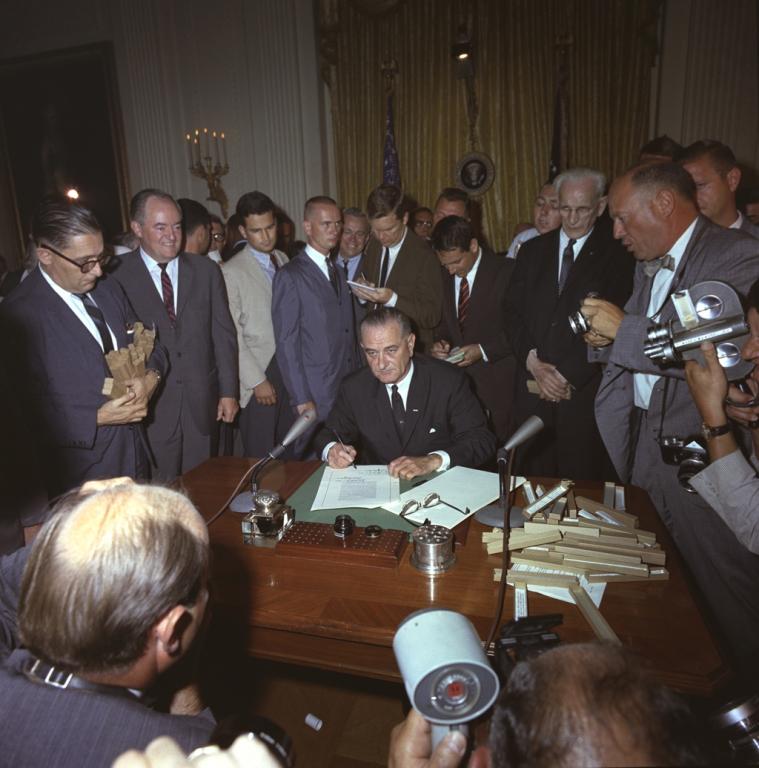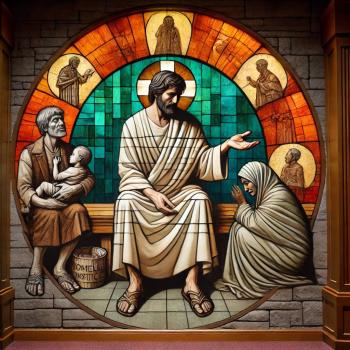
On July 2, 1964, President Lyndon Johnson signed into law the Civil Rights Act of 1964.
The year before, in a landmark nationally televised address on June 6, 1963, President John F. Kennedy laid out the stark terms of racism in the United States that evening.
“The Negro baby born in America today, regardless of the section of the Nation in which he is born, has about one-half as much chance of completing a high school as a white baby born in the same place on the same day, one-third as much chance of completing college, one-third as much chance of becoming a professional man, twice as much chance of becoming unemployed, about one-seventh as much chance of earning $10,000 a year, a life expectancy which is seven years shorter, and the prospects of earning only half as much.”
To be clear, slavery had ended just a century before, after nearly 300 years. Much of the U.S. remained a segregated society when Kennedy said, “We are confronted primarily with a moral issue. It is as old as the scriptures and is as clear as the American Constitution.”
In the days that followed, Kennedy proposed sweeping changes addressing voting rights, public accommodations, school desegregation, and other remedies designed to address legalized racism in the U.S.
“If an American, because his skin is dark, cannot eat lunch in a restaurant open to the public, if he cannot send his children to the best public school available, if he cannot vote for the public officials who will represent him, if, in short, he cannot enjoy the full and free life which all of us want, then who among us would be content to have the color of his skin changed and stand in his place?” Kennedy asked the white American public.
After Kennedy’s assassination on Nov. 22, 1963, Johnson worked tirelessly to push through the civil rights legislation as Kennedy’s legacy.
When the Senate finally passed the legislation, 27 Senators voted against it – representing all of the Confederate states who had rebelled against the U.S. over the right to enslave people and had continued to discriminate against their black residents during the subsequent century.
The Civil Rights Act outlawed segregation in businesses like restaurants, hotels and theaters and public places like parks, libraries and public schools.
Title VII of the act created the Equal Employment Opportunity Commission (EEOC) to implement the law. The EEOC enforces laws that prohibit discrimination based on race, color, religion, sex, national origin, or disability.
Since 1978, colleges and universities have been allowed to take into consideration the race of applicants. That decision was reaffirmed in 2003, 2013, and 2016.
In June 2023, the activist Supreme Court reversed 45 years of legal precedent and outlawed the practice of race-conscious college admissions with a decision in two cases — Students for Fair Admissions Inc. v. University of North Carolina and Students for Fair Admissions Inc. v. President & Fellows of Harvard College.
Bit by bit, a 45-year-old law here, a 58-year-old law there, and the hard-won advances for black people are being chipped away by the exact same kinds of racists who opposed granting those God-given rights in the first place.
For 349 years it was the law of the land to discriminate against black people in the U.S.
Despite centuries of inequality, the Court has repeatedly found that legislation intended to benefit black people is discriminatory, based on the relatively modern belief that black and white people should be treated equally.
Repeatedly, conservative Supreme Court justices have ruled that Civil Rights legislation wasn’t intended to give relief to black people, but instead it rendered black and white people as equal before the law, and nothing more.
If the only reason to have Civil Rights laws in the U.S. is to ensure equal footing for white and black people, then that would explain why so little has changed for black people in the U.S. in the past 58 years – black people can’t be equal if they are standing in a 349-year-old hole of legal discrimination and bigotry.
No significant legislation has ever been passed to seriously address the effects of the discrimination that continues to stain this country.
Despite hundreds of years of much worse oppression of black people, the U.S. has never had the equivalent of South Africa’s Commission of Truth and Reconciliation that investigated the atrocities of Apartheid.
White Americans can’t even agree on verifiable facts from American history concerning race and racism. Instead, white, Republican state legislatures pass laws trying to stifle learning and teaching about America’s racist past.
58 years ago, one quarter of the Senate opposed giving equal rights to black citizens of the country, wanting to continue legal discrimination. A solid percentage of the country continues to oppose civil rights for black people because that’s what racists do.
Justice delayed is justice denied. And black Americans have been denied justice for too long.













